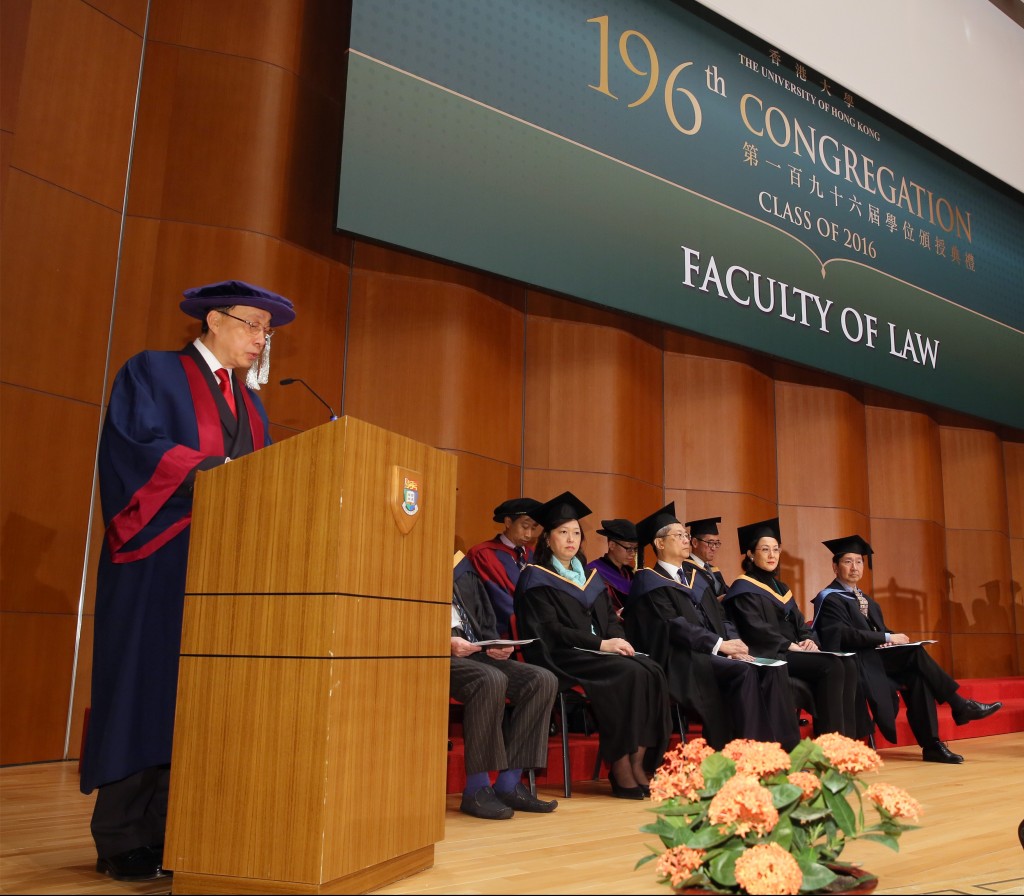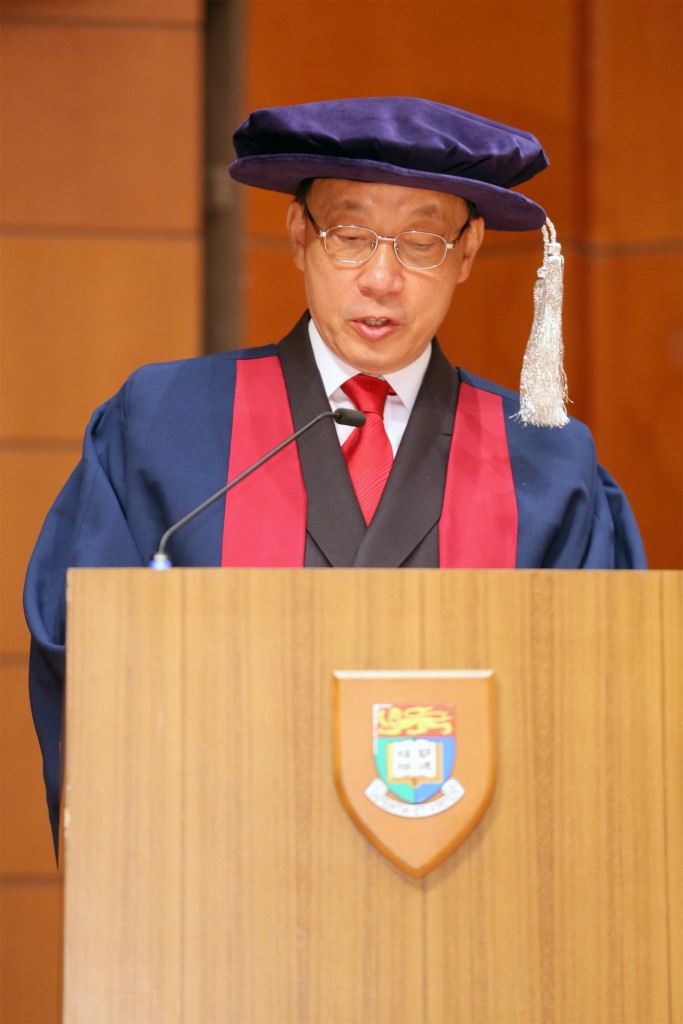PRESS RELEASES | JAN 03, 2017
Speech by Mr. Edward Chan, S.C. at the 196th Congregation

It is indeed my privilege and honour to be invited to address this congregation of law graduates of The University of Hong Kong.
Today is an important milestone date in the career and possibly the life of many of you. It marks an important stage of your education.
After your LLB degree, many of you may opt for a career in law, joining the PCLL programme and preparing yourselves to be qualified as a solicitor or a barrister with or without the view to be in private practice in the future. Some of you may also decide to continue with your pursuit of knowledge, insight and research in law and would like to pursue a higher degree in law. Others may opt for a career in other fields such as in the civil service or in industry and commerce.
When the law department of The University of Hong Kong was first set up with its first batch of LLB graduates in 1972, the overwhelming majority of the graduates would choose to become qualified lawyers in private practice and only a few had decided to join the civil service or other commercial private sectors. Relative to the number of LLB graduates, the number of places available in the PCLL course then was abundant and only a few who aspired to be qualified were turned away from the PCLL course on account of their performance in their degree result.
The situation has changed entirely after all these years. With a large number of law graduates from overseas, the competition for a place in the PCLL course is very keen.
Some of you may be dissatisfied for not being able to gain a place in the PCLL which is a pre-requisite for getting qualified. The reality of life is that Hong Kong simply could not absorb all law graduates as practicing lawyers.
However, for those who could not secure a place in the PCLL, this does not mean that the knowledge and training you have in your law degree course would be wasted. I dare say that graduates with a law degree will definitely compete favorably with other degree holders in the civil service and in many fields in commerce.

Throughout the 4 years’ law degree course, you have no doubt acquired a massive amount of knowledge in various areas of the law. However, I can assure you that what you acquired by way of legal knowledge would not be sufficient to give you a ready answer to all the legal problems that you would face in the future. Indeed, there is no course of study which could provide the students with the ready answers to all the problems that they would face in the future. What is the most important thing that you gained in your degree course is the building blocks which would enable you to approach the problem analytically and logically and to know how to find the answer to the problems you face. In this way, in the future, you would be able to find a solution to the problem whether it be a legal one or not.
Hong Kong is a place where the traditional Chinese culture meets the western culture. Traditionally in imperial China, lawyer was not a very reputable profession. We often hear of the terms like ⌈師爺⌋ and ⌈狀棍⌋ which are certainly not complementary at all. However, the situation has changed even in a Chinese setting like Hong Kong. Over the 150 odd years of British colonial rule and the influence of the common law, the Rule of Law has become deeply rooted in Hong Kong and is now an important asset for Hong Kong’s continuous success. Of course the Rule of Law could not be maintained without a sufficient number of well-trained lawyers vigilant in the defence of the Rule of Law. However just with the effort of lawyers would not be sufficient. The Rule of Law could only be successfully maintained if the community as a whole would have a proper understanding of meaning and the essential elements of the Rule of Law and would pay genuine respect to it and not just paying lip service to it.
This is certainly not the occasion for me to discuss with you the essential feature of the Rule of Law. Indeed, as law graduates of The University of Hong Kong, this is something that you would not miss in your degree learning.
But how would you apply your learning from your degree course? As students of this University, you have a distinct head start in knowing the answer.
Why do I say that?
The day you entered the University and saw the Coat of Arms of the University, you would have got the clue to answer the question of how to apply your learning. You can see from the motto inscribed in the University’s Coat of Arms the 4 Chinese characters: ⌈明德⌋、⌈格物⌋. These words were taken from the Confucian classic 《大學》 (The Great Learning).
⌈明德⌋means “manifesting virtue” and ⌈格物⌋ means “to investigate or evaluate things”. At first glance one may wonder what has these 2 phrases taken from an old Confucian Classic got to do with the application of your learning of the law and in particular the common law which has its origin in Britain, a western country. On this I would say that the motto and your learning could certainly be combined.
Take the Rule of Law as an example. As lawyer you learned the virtue of the Rule of Law and even though this is a concept of western origin, applying the concept of ⌈明德⌋, you should be conscious and vigilant of the manifestation of this virtue of the Rule of Law. Also you have to consciously apply the concept of ⌈格物⌋, i.e. to evaluate and investigate things. Hence in life when you are faced with any event or proposition, you should use your judgment based on the virtue of what you learn to evaluate and decide whether such event or proposition presented to you should be accepted or acted upon by you.
In this respect when you are faced with people who keeps on asserting that what he does is in accordance with the law and is consistent with the Rule of Law, you should carefully evaluate what he asserts before you would accept his proposition.
In fact, if you would look at the motto in Latin Sapientia et Virtus which I understand would mean Wisdom and Virtue, you would also see that it also echoes the meaning of ⌈明德⌋、⌈格物⌋. Sapientia reflects the idea of ⌈格物⌋ and Virtus carries the ingredients of ⌈明德⌋.
Hence dear law graduates of The University of Hong Kong, while you are celebrating your hard earned degree in law reflecting your hard work in the last 4 years or 5 years for double degree holders, do stop and reflect on how you should apply what you learn. In this respect, you would find that the 2 phrases from the Confucian classic 《大學》inscribed in the University Coat of Arms would give you good insight and guidance.
Thank you.
Back to News